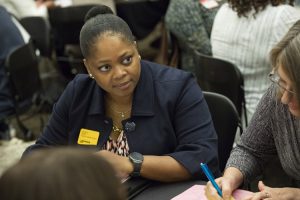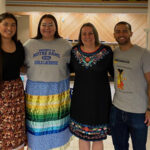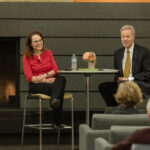For the university’s second year as “super host” of the Greater Milwaukee Foundation’s “On the Table” communitywide conversation, no topic was off the table. In groups of eight, UWM faculty, staff, alumni and community members came together to discuss challenges that stymie progress in southeastern Wisconsin and in other metropolitan regions: systemic racism, funding models for public amenities like mass transit and museums, the opioid epidemic, childhood poverty and trauma.
But On the Table organizers at the Greater Milwaukee Foundation and facilitators at UWM have more in common than honest conversation. They also share a desire to see southeastern Wisconsin thrive, and they are willing to make new connections, build diverse networks and entertain creative solutions to get the job done.
That’s why UWM’s On the Table convener, UWM Vice Chancellor of Global Inclusion & Engagement Joan Prince, asked for names, email addresses and a set of notes from each table. She’s aiming to capture the ideas and energy generated across the UWM Student Union Wisconsin Room on Tuesday, Oct. 9.
In fact, On the Table attendees can apply for a mini grant to continue their conversation and make steps toward implementing positive change. Grants are available through the Office of Global Inclusion & Engagement; contact Joan Prince at prince@uwm.edu. The Greater Milwaukee Foundation also will award “Ideas to Action” funds of $500 to $2,500. Online applications will be accepted through Oct. 31.
Table Three, sponsored by the Black Cultural Center, talked about expanding partnerships for UWM’s annual Black Male Summit. They only had about an hour to brainstorm, but that was plenty of time to generate three promising new ideas: recruit corporate sponsors for the event, invite religious schools to participate in the summit and involve representatives from the Milwaukee County District Attorney’s office as a participant or speaker.
The conversation at Table 14 was facilitated by research partners and social welfare professors Tina Freiburger and Melinda Kavanaugh. A fatality review indicated that more than 400 people died of an opioid overdose in Milwaukee County last year. Their table talked about the children affected by these deaths, and sketched out a model for an integrated, responsive resource network that can step in and provide specialized care for them.
Tables 12 and 13 were convened by the Helen Bader Institute for Nonprofit Management. Federal funds are decreasingly available for shelters, museums and landmarks, so the tables discussed new funding avenues to explore and different ways to leverage volunteer and board support to fill in operational gaps.
Expanding access to trauma-informed care resources in Milwaukee-area schools was on the agenda for Table Nine. “Teachers and educators are amazing. Phenomenal,” said one participant. “But we can’t ask them to do everything like screening and referrals. We need systemic change for trauma-informed care in our schools.”
“Thank you so much for coming,” Prince told the group during break in conversation. “Events like this are an important way to bring our UWM family together.”








